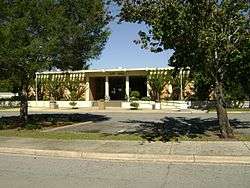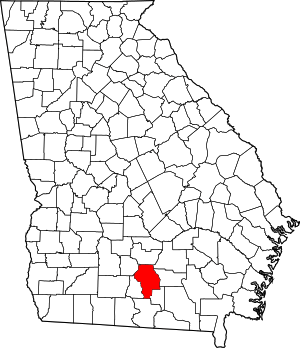Nashville, Georgia
Nashville is a city in Berrien County, Georgia, United States. The population was 4,939 at the 2010 census.[5] The city is the county seat of Berrien County.[6] It is called the "City of Dogwoods", as the tree grows in large numbers around the area.
Nashville, Georgia | |
|---|---|
 Nashville City Hall | |
 Location in Berrien County and the state of Georgia | |
| Coordinates: 31°12′25″N 83°14′48″W | |
| Country | United States |
| State | Georgia |
| County | Berrien |
| Area | |
| • Total | 4.71 sq mi (12.18 km2) |
| • Land | 4.65 sq mi (12.05 km2) |
| • Water | 0.05 sq mi (0.14 km2) |
| Elevation | 240 ft (73 m) |
| Population (2010) | |
| • Total | 4,939 |
| • Estimate (2019)[2] | 4,851 |
| • Density | 1,042.78/sq mi (402.65/km2) |
| Time zone | UTC-5 (Eastern (EST)) |
| • Summer (DST) | UTC-4 (EDT) |
| ZIP code | 31639 |
| Area code(s) | 229 |
| FIPS code | 13-54264[3] |
| GNIS feature ID | 0332466[4] |
| Website | www |
History
.jpg)
Nashville was founded about 1840. In 1856, Nashville was designated seat of the newly formed Berrien County. It was incorporated as a town in 1892 and as a city in 1900.[7] The city is named after Francis Nash (1742–1777), an officer in the American Revolutionary War.[8]
Geography
According to the United States Census Bureau, the city has a total area of 4.7 square miles (12.2 km2), of which 4.6 square miles (12.0 km2) is land and 0.039 square miles (0.1 km2), or 1.13%, is water.[5]
Demographics
| Historical population | |||
|---|---|---|---|
| Census | Pop. | %± | |
| 1870 | 95 | — | |
| 1890 | 426 | — | |
| 1900 | 293 | −31.2% | |
| 1910 | 990 | 237.9% | |
| 1920 | 2,025 | 104.5% | |
| 1930 | 1,672 | −17.4% | |
| 1940 | 2,449 | 46.5% | |
| 1950 | 3,414 | 39.4% | |
| 1960 | 4,070 | 19.2% | |
| 1970 | 4,323 | 6.2% | |
| 1980 | 4,831 | 11.8% | |
| 1990 | 4,782 | −1.0% | |
| 2000 | 4,697 | −1.8% | |
| 2010 | 4,939 | 5.2% | |
| Est. 2019 | 4,851 | [2] | −1.8% |
| U.S. Decennial Census[9] | |||
As of the census[3] of 2000, there were 4,697 people, 1,864 households, and 1,213 families residing in the city. The population density was 1,012.2 people per square mile (390.8/km2). There were 2,098 housing units at an average density of 452.1 per square mile (174.6/km2). The racial makeup of the city was 75.94% White, 21.57% African American, 0.28% Native American, 0.45% Asian, 0.02% Pacific Islander, 0.92% from other races, and 0.83% from two or more races. Hispanic or Latino of any race were 1.58% of the population.
There were 1,864 households, out of which 31.7% had children under the age of 18 living with them, 44.2% were married couples living together, 16.5% had a female householder with no husband present, and 34.9% were non-families. 30.8% of all households were made up of individuals, and 12.3% had someone living alone who was 65 years of age or older. The average household size was 2.44 and the average family size was 3.05.
In the city, the population was spread out, with 27.2% under the age of 18, 8.3% from 18 to 24, 27.5% from 25 to 44, 21.6% from 45 to 64, and 15.4% who were 65 years of age or older. The median age was 36 years. For every 100 females, there were 87.4 males. For every 100 females age 18 and over, there were 84.0 males.
The median income for a household in the city was $26,228, and the median income for a family was $33,320. Males had a median income of $22,725 versus $19,533 for females. The per capita income for the city was $15,007. About 20.6% of families and 25.8% of the population were below the poverty line, including 40.6% of those under age 18 and 15.3% of those age 65 or over.
Education
Berrien County students in kindergarten to grade twelve are in the Berrien County School District, which consists of two elementary schools, a middle school, a high school, and a charter school.[10] The district has 172 full-time teachers and over 3,037 students.[11]
- Berrien Primary School
- Berrien Elementary School
- Berrien Middle School
- Berrien High School
- Berrien Academy
The city of Nashville is served by a public library, the Carrie Dorsey Perry Memorial Library, a part of the Coastal Plain Regional Library System network.[12]
Climate
The climate in this area is characterized by relatively high temperatures and evenly distributed precipitation throughout the year. According to the Köppen Climate Classification system, Nashville has a humid subtropical climate, abbreviated "Cfa" on climate maps.[13]
| Climate data for Nashville, Georgia | |||||||||||||
|---|---|---|---|---|---|---|---|---|---|---|---|---|---|
| Month | Jan | Feb | Mar | Apr | May | Jun | Jul | Aug | Sep | Oct | Nov | Dec | Year |
| Average high °C (°F) | 17 (62) |
19 (66) |
22 (72) |
27 (80) |
30 (86) |
33 (91) |
33 (92) |
33 (92) |
31 (88) |
27 (81) |
23 (73) |
18 (65) |
26 (79) |
| Average low °C (°F) | 3 (37) |
4 (40) |
8 (46) |
12 (53) |
16 (60) |
19 (66) |
20 (68) |
20 (68) |
18 (65) |
12 (54) |
7 (45) |
4 (39) |
12 (53) |
| Average precipitation mm (inches) | 110 (4.5) |
120 (4.8) |
120 (4.7) |
110 (4.2) |
110 (4.4) |
120 (4.9) |
140 (5.6) |
150 (6.1) |
86 (3.4) |
53 (2.1) |
64 (2.5) |
110 (4.2) |
1,300 (51.2) |
| Source: Weatherbase [14] | |||||||||||||
References
- "2019 U.S. Gazetteer Files". United States Census Bureau. Retrieved July 9, 2020.
- "Population and Housing Unit Estimates". United States Census Bureau. May 24, 2020. Retrieved May 27, 2020.
- "U.S. Census website". United States Census Bureau. Retrieved 2008-01-31.
- "US Board on Geographic Names". United States Geological Survey. 2007-10-25. Retrieved 2008-01-31.
- "Geographic Identifiers: 2010 Demographic Profile Data (G001): Nashville city, Georgia". U.S. Census Bureau, American Factfinder. Archived from the original on February 12, 2020. Retrieved November 4, 2013.
- "Find a County". National Association of Counties. Retrieved 2011-06-07.
- Hellmann, Paul T. (May 13, 2013). Historical Gazetteer of the United States. Routledge. p. 241. Retrieved 30 November 2013.
- Krakow, Kenneth K. (1975). Georgia Place-Names: Their History and Origins (PDF). Macon, GA: Winship Press. p. 156. ISBN 0-915430-00-2.
- "Census of Population and Housing". Census.gov. Retrieved June 4, 2015.
- Georgia Board of Education, Retrieved May 30, 2010.
- School Stats, Retrieved May 30, 2010.
- "Carrie Dorsey Perry Memorial Library". Coastal Plain Regional Library. Archived from the original on 2015-10-30. Retrieved 2017-05-10.
- Climate Summary for Nashville, Georgia
- "Weatherbase.com". Weatherbase. 2013. Retrieved on September 28, 2013.
External links
| Wikimedia Commons has media related to Nashville, Georgia. |
